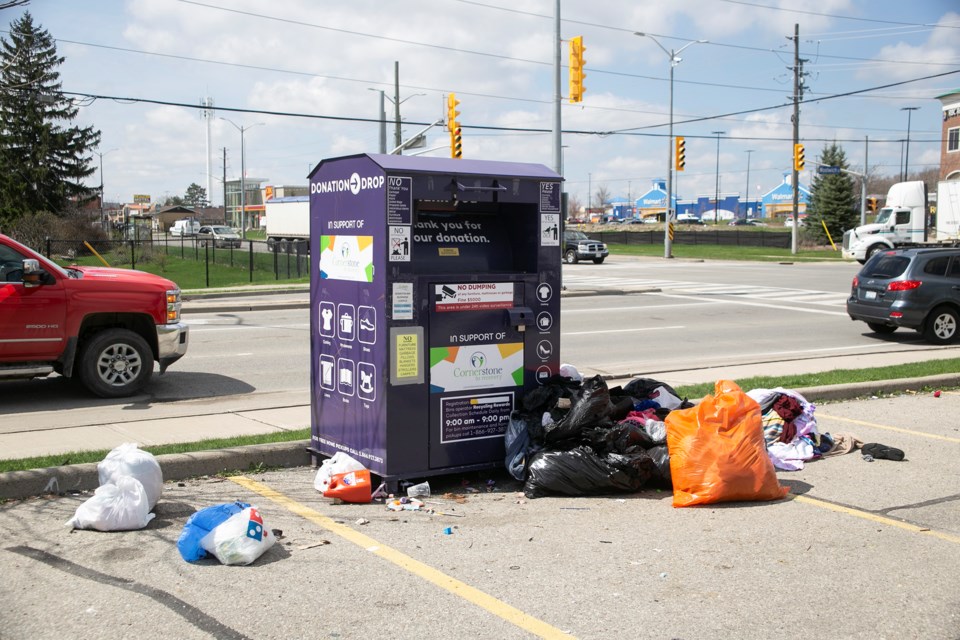More than a year into the pandemic, charities that rely on donation bins across the city are trying to keep up with the items coming in and dealing with the garbage that is sometimes left behind.
Donation bins bring in money for charities but are often operated by private companies. The items collected are then often sold to thrift stores like Value Village or Talize, with funds shared between the operator and the charity.
Recycling Rewards, which operates donation bins across Ontario in support of Cornerstone to Recovery, operates about a dozen bins in Guelph, said business development manager Patricia Waud.
Cornerstone to Recovery is a recovery resource in York Region which supports people impacted with addiction.
Recycling Rewards has been collecting items like clothing, housewares and toys from its bins throughout the pandemic, said Waud.
“You’re stuck in your house, what else are you going to do but purge?” said Waud of the donors who use the bins.
But one of the problems in the industry are those people who don’t use the bins properly by leaving behind unwanted items and, in some case, actual garbage.
Sometimes those bins need to be sealed off or moved to avoid problem areas where people constantly dump improperly, said Waud.
“We were sealing certain bins off, keeping other bins open and working with the property managers if they wanted the bin moved we would do as they asked,” said Waud. “Any time someone dumps in front of our bins, it takes away from the charities we support. When they dump garbage it adds to the cost for us to incur and trickles down to the charity as well.”
Waud hopes people will remember that when they think about leaving items outside of the bins.
Recycling Rewards collects from each bin at least once a day, said Waud, and sometimes up to four times in a day.
Under normal circumstances the trucks would then that the items directly to its retail partner Talize, but during COVID lockdowns the items are taken to a warehouse to be sorted and distributed at a later date.
If a bin is full, items can sometimes be left outside, which leaves them open to the elements. Items spoiled by rain need to be thrown out and are wasted.
“It’s the furniture, the mattresses, the empty cardboard boxes or just the plain garbage people sometime unfortunately leave, no matter how many signs, how big the sign is, no matter if you say there is a camera watching them — they simply don’t care,” said Waud.
“We still pick it up and clean the bin, no matter what, because that’s our responsibility,” said Waud of the improper items that are sometimes left behind.
At one point last year, the issue was so bad that staff from the City of Guelph collected many of the bins from around town and stored them temporarily.
Since then, the bins have been put back and the municipality hasn’t collected them since, said a spokesperson for the City of Guelph.
Recently, Diabetes Canada issued a press release asking people to not leave furniture, garbage and other items outside its donation bins in Ontario. In one case a boat was dumped outside one of its bins in Sudbury.
Diabetes Canada maintains two donation bins in Guelph and only accept textiles.
“If the donated textile doesn’t fit inside the bin drawer, then it is not an accepted donation,” says Sean Shannon, president and CEO of National Diabetes Trust in the release.
The funds generated supports diabetes research and helps to send kids with Type 1 diabetes to camp.
In the news release, Diabetes Canada said the stay-at-home order and closure of donation centres is contributing to the growth of dumping around donation bins.
“Unfortunately, as a result of the ongoing non-essential retail closures in Ontario we are seeing hundreds of bins that have had debris and garbage left around them, which costs us time and money to remove and dispose of at local landfills instead of us collecting clothes to be reused or recycled,” said Shannon.
“Even if the bags were originally helpful donations, leaving them outside any bin quickly results in a wet, spoiled donation. Donors should put the bag inside the bin, or not at all if the bin is full.”
